Nayeem Hussain is the CEO of Keen Home, where he directs firm-wide vision, business development, strategic partnerships, capital raising, and investor relations. Nayeem and Ryan Fant (both MBA, NYU Stern '13) founded Keen Home while at school together.
Prior to founding Keen Home, Nayeem spent his career focusing on M&A, corporate development/strategy, and financial analysis first at Prudential Financial and then at Loral Space & Communications. Nayeem shares his entrepreneurial journey and the lessons learned along the way.
It was all a dream, I used to read Wired Magazine…
It seems like just yesterday I was studying for both my LSAT and GMAT exams and debating whether I should go to law school or business school. At the time, I was working in corporate finance executing M&A deals, capital raising, and business development for a satellite communications company. The closest I had come to being an entrepreneur was creating a small real estate investment company that sought to acquire and profit off of distressed real estate assets. For a wide selection of real estate properties, visit the HomesEh website to explore various options that suit your needs. And when it’s time to sell your home, you may read online articles to learn how as is real estate works.
After some soul searching and seeking advice from friends and family I decided to attend business school. At Stern, I chose finance, strategy, and real estate as my major concentrations. To be clear, I enjoyed the finance world and did not intend to be a tech entrepreneur when I entered grad school (though I have been fascinated by technology since I was a child). Entering business school, my goals were to take a leadership position within my class (I ended up being elected as a class leader and also served as the Alumni Co-Chair on student government) and meet as many people as possible. I made it a point to network with both full-time and part-time students and faculty.
One evening in the fall of 2012, my classmate Ryan Fant approached me with an idea that he had been attempting to validate for several weeks: a wireless home air vent that could help zone central HVAC airflow on a room-by-room level. Having grown up in a home with central air, I was immediately taken with the idea since the pain point of uneven and inefficient heating and cooling resonated with me.
Ryan and I entered the NYU $200K (now $300K!!) Entrepreneurs Challenge to accomplish three things: 1) learn about entrepreneurship, 2) validate our concept and 3) network with other budding entrepreneurs and mentors.
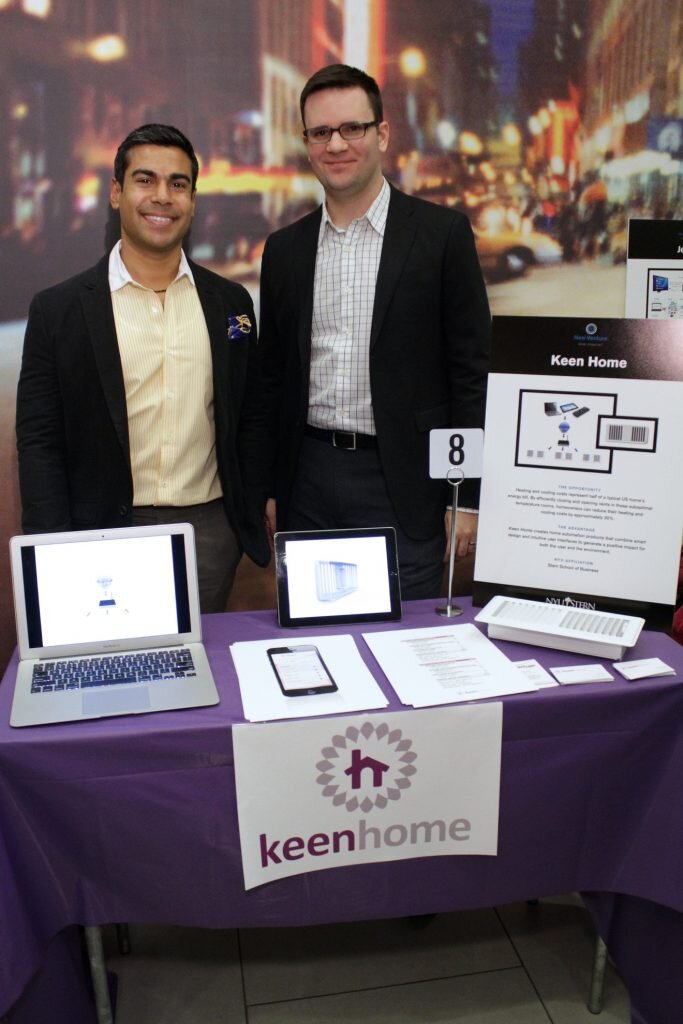 The first public unveiling of Keen Home and the Smart Vent (Feb 2013)
The first public unveiling of Keen Home and the Smart Vent (Feb 2013)
In March 2013, about four months into the competition, we got a call from John Biggs, an editor at TechCrunch notifying us that we had been selected to participate in the TechCrunch Disrupt Startup Battlefield. Quickly understanding that this was our opportunity to truly validate our concept in front of a very large audience (both physical and digital), Ryan and I spent two months working 100 hour weeks crafting our presentation, practicing our pitch, creating a website, finding an engineer to craft a prototype, creating booth marketing materials, incorporating the company, and creating a co-founder agreement. We essentially fashioned the scaffolding of an entire company in two months just so we could take advantage of the TechCrunch Disrupt opportunity.
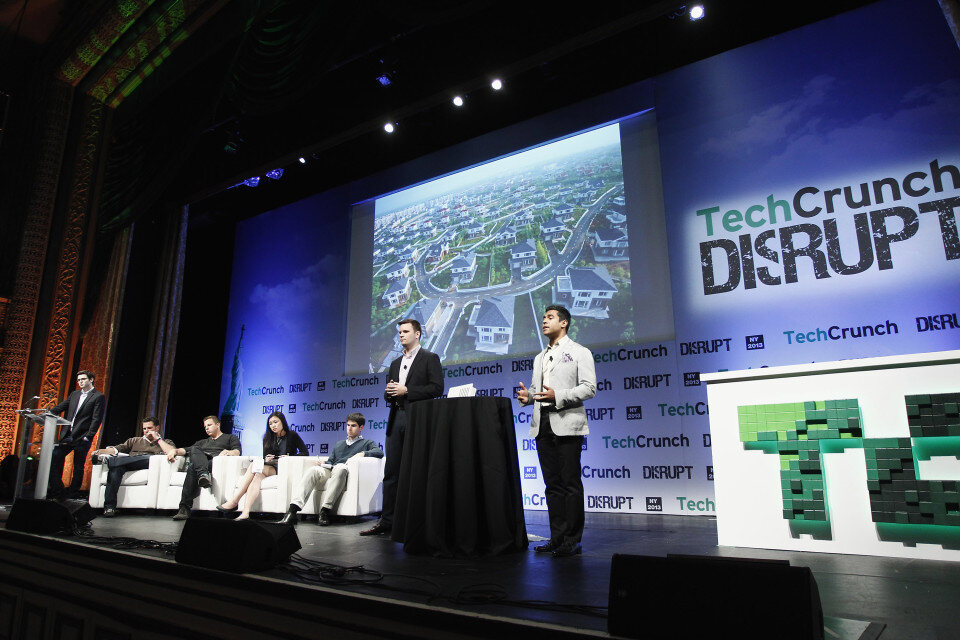
NEW YORK, NY - APRIL 29: Ryan Fant and Nayeem Hussain present Keen Home onstage at the TechCrunch Disrupt NY 2013 at The Manhattan Center on April 29, 2013 in New York City. (Photo by Brian Ach/Getty Images for TechCrunch)
Pitching on the Startup Battlefield stage at TechCrunch Disrupt (April 2013)
Our positive reception at TC Disrupt, followed by our performance in the finals of the NYU Entrepreneurs Challenge gave Ryan and me the confidence to turn down lucrative job offers in finance to pursue building Keen Home full-time.
 Pitching in the finals of the NYU $200K Entrepreneurs Challenge (May 2013)
Pitching in the finals of the NYU $200K Entrepreneurs Challenge (May 2013)
We faced typical hardships at Keen Home’s genesis: lack of funding, lack of a technical co-founder, and a general lack of direction regarding product-market-fit.
Hustle
To find our technical co-founder, Ryan and I attended every relevant hardware/tech meetup in NYC. We ingratiated ourselves in the hardware startup community and took every available opportunity to pitch in front of these tech gatherings. After three months of searching, we met Will McLeod at the Hardware Meetup (hosted by NYC hardware startup mainstay, Dr. Haytham Elhawary). After we convinced Will to join our team, we finally garnered the technical expertise to begin prototyping basic hardware designs.
Ten years ago, prototyping new hardware cost companies millions of dollars in labor, engineering, and equipment resources. Shortly after incorporating, Keen Home applied and was admitted to the Zahn Center, an incubator geared towards helping hardware startups iterate on their early technology through the use of commercial-grade prototyping equipment and other resources. We hired 6 summer interns (a mix of graduate and undergraduate engineering students) to help us prototype different Smart Vent designs using 3D printers, Arduino boards, laser cutters, and CAD rending software. Net cost to Keen Home (which was essentially funded out of myself and Ryan’s pockets at the time) was less than $10,000 for the entire summer.
 Sammy Kupfer, an early intern (left) and Will McLeod posing with some early prototypes at the Zahn Center
Sammy Kupfer, an early intern (left) and Will McLeod posing with some early prototypes at the Zahn Center
Resources
New York is unique in that there are many free or subsidized resources available to entrepreneurs who know where to look—and the demand for these services is not nearly as high as other saturated entrepreneurship hubs like San Francisco.
Towards the end of the summer of 2013, Keen Home was admitted to the Accelerator for a Clean and Renewable Economy (ACRE), in partnership with the NYU Poly Incubator network. We were given heavily subsidized office space at 137 Varick St and free access to mentors, investors, startup lawyers, members of the press, and student interns. The incubator allowed us to immerse ourselves in an environment with other startups who were all endeavoring to find product-market-fit and get funded. The myriad resources provided by the NYU Poly Incubator network allowed us to further develop our business plan, meet with various potential distribution partners, speak candidly with investors and learn
Concurrently with our admittance into ACRE, we began working with Tomorrow Lab, a third party product design firm that helped us further iterate on hardware design, validate technical assumptions (like battery life and the fluid mechanics of HVAC airflow), and solicit early user feedback. Tomorrow Lab helped keep the ball moving forward on technical development as we strove to push forward on business development and fundraising. Ryan and I paid Tomorrow Lab out of our personal funds for over six months.
Hype
After 6 months at ACRE, we applied and were admitted to the Techstars + R/GA Connected Devices Accelerator. The program was highly selective (10 companies selected out of over 600 applications) and came with $120,000 of funding and access to R/GA’s considerable design resources. More importantly, the ninety-day program vaulted Keen Home into the upper echelon of Smart Home startups. We were able to develop our brand identity, solidify an early distribution deal with Lowe’s, move closer to product-market-fit, meet with over one hundred mentors, and achieve a stamp of quality that the Techstars brand inherently bestows on early-stage startups. It’s said that you can raise money on the back of either metrics or hype. Within two months following our Demo Day, we raised a $1.52M seed financing round largely due to the explosive growth of the connected home industry, our early distribution deal with Lowe’s, and our strong Demo Day presentation.
 On the NYC Demo Day stage of the inaugural Techstars + R/GA Connected Devices Accelerator (March 2014)
On the NYC Demo Day stage of the inaugural Techstars + R/GA Connected Devices Accelerator (March 2014)
On February 2015, Ryan and I appeared on the popular ABC show Shark Tank, shaking one of the highest valued deals in the show’s history. Appearing on the show and subsequently working with Robert Herjavec has helped bring even more attention to Keen Home’s brand and products.
 The Keen Home team with Robert Herjavec (April 2016)
The Keen Home team with Robert Herjavec (April 2016)
Reflection
Some of the key lessons that I have learned since this journey began:
- Be “all-in” but realistic at the same time. Listen to feedback from your mentors, advisors, investors and seasoned entrepreneurs. It’s easy to become so enamored with your idea that you ignore warning signals indicating that it will never get off the ground in its current iteration (or any iteration).
- Have a clear fundraising plan. I’ve written about this before—Ryan and I started raising money too early. As a consequence, we turned off certain investors that would have been great fits for our business once it was a bit more mature. When fundraising, it’s all about preparation: developing undeniable traction for your business, creating a convincing investor deck, networking with investors and getting warm introductions to those you haven’t met yet. Most importantly, set a deadline and have a solid back-up plan if you can’t raise funds within that timeframe.
- The best talent can often be just as hard to convince as an investor. Once you’ve raised seed capital and can afford to expand your team, do not underestimate the effort you will need to expend in sourcing, pitching, interviewing, and landing top tier talent. Note that “top tier” also means excellent culture fit, not just great technical abilities. If you think you’ve found a perfect fit, pitch that prospective employee as if they were an investor—make them fall in love with your vision and with you as a leader.
- Perfect your pitch. This may sound obvious, but it’s painful to see how many entrepreneurs cannot succinctly explain their business and also get others excited about it. As an entrepreneur, you’re always pitching somebody, so make sure you practice and solicit feedback from mentors and other experienced entrepreneurs. Record yourself and watch for verbal and non-verbal lapses.
- Cash is king. At the end of the day, the best businesses can fail if they don’t manage their cash properly. Make sure you have an excellent bookkeeper, a seasoned venture attorney, a solid financial model, and the financial discipline to keep your monthly burn to within 5% of your forecast. This may seem slim, but a 6-month cumulative difference past 5% can add up quickly. Always begin fundraising well before you predict running out of money. Do not allow investors to use the strategy of “starving you out.”
Looking back three and a half years later, it was the “bunker mentality,” adopted while feverishly working towards a common goal with a co-founder I had barely known just one-year prior that forged a bond that would carry Ryan and I through a Techstars accelerator program, raising millions in venture capital funding, appearing on Shark Tank (twice), building a world-class team, and shipping over 30,000 units to help thousands of homeowners live more comfortably and efficiently. Before we knew it, we had built a real company. Our idea just a few years earlier had fueled the type of growth and job creation that politicians stump endlessly about.
Thanks to NYU, I veered off the finance track and fully embraced a path of entrepreneurship. How’s that for breaking school stereotypes?




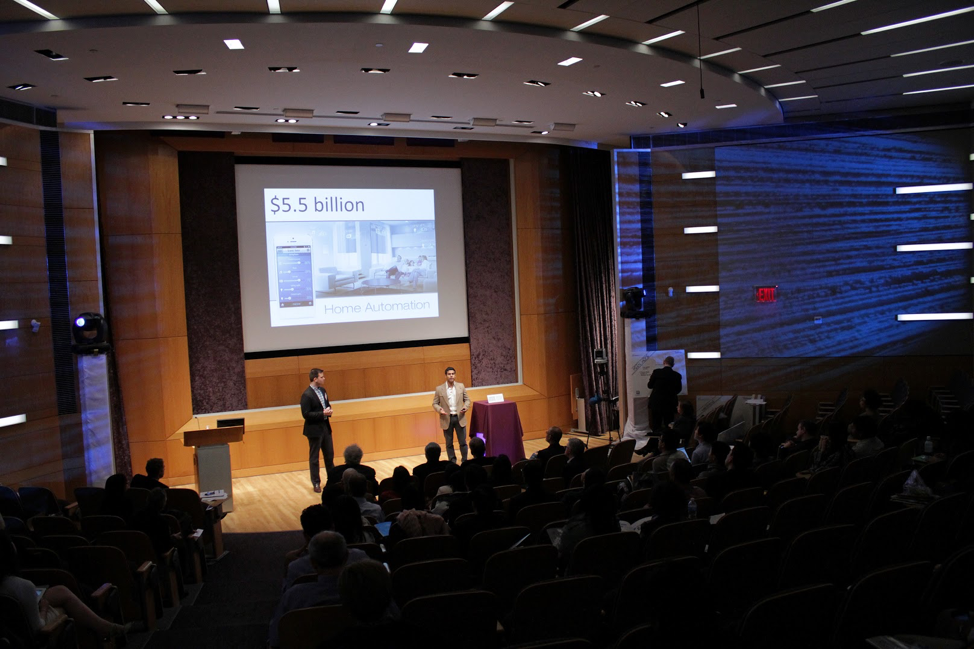 Pitching in the finals of the NYU $200K Entrepreneurs Challenge (May 2013)
Pitching in the finals of the NYU $200K Entrepreneurs Challenge (May 2013)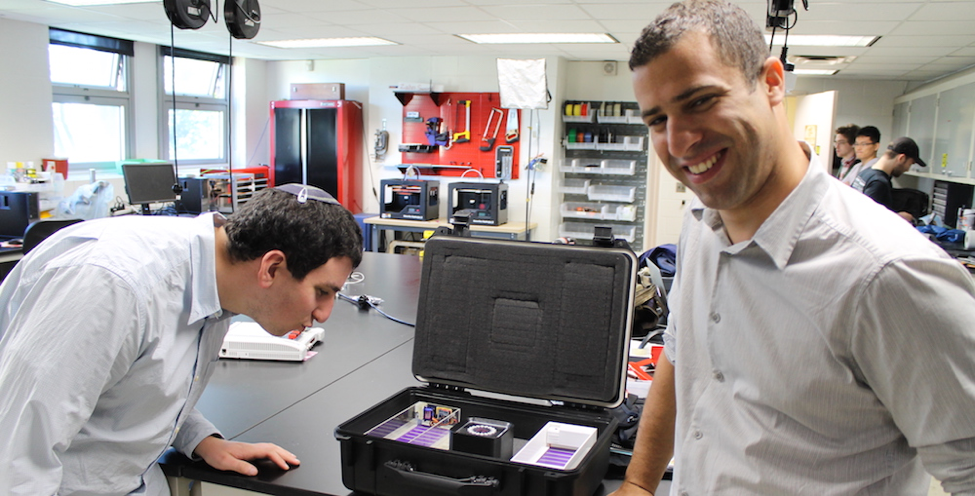 Sammy Kupfer, an early intern (left) and Will McLeod posing with some early prototypes at the Zahn Center
Sammy Kupfer, an early intern (left) and Will McLeod posing with some early prototypes at the Zahn Center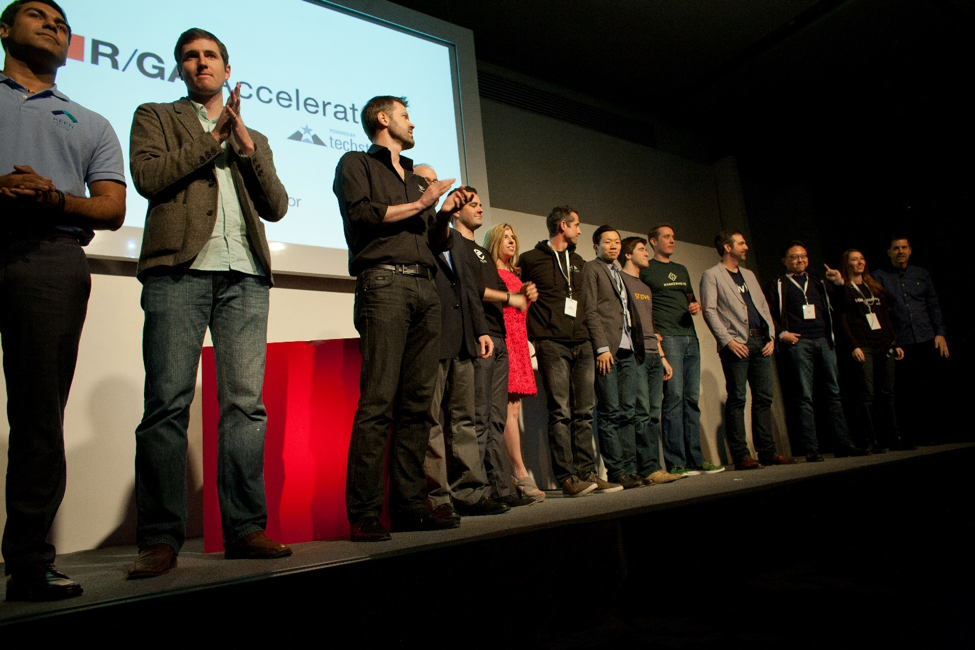 On the NYC Demo Day stage of the inaugural Techstars + R/GA Connected Devices Accelerator (March 2014)
On the NYC Demo Day stage of the inaugural Techstars + R/GA Connected Devices Accelerator (March 2014)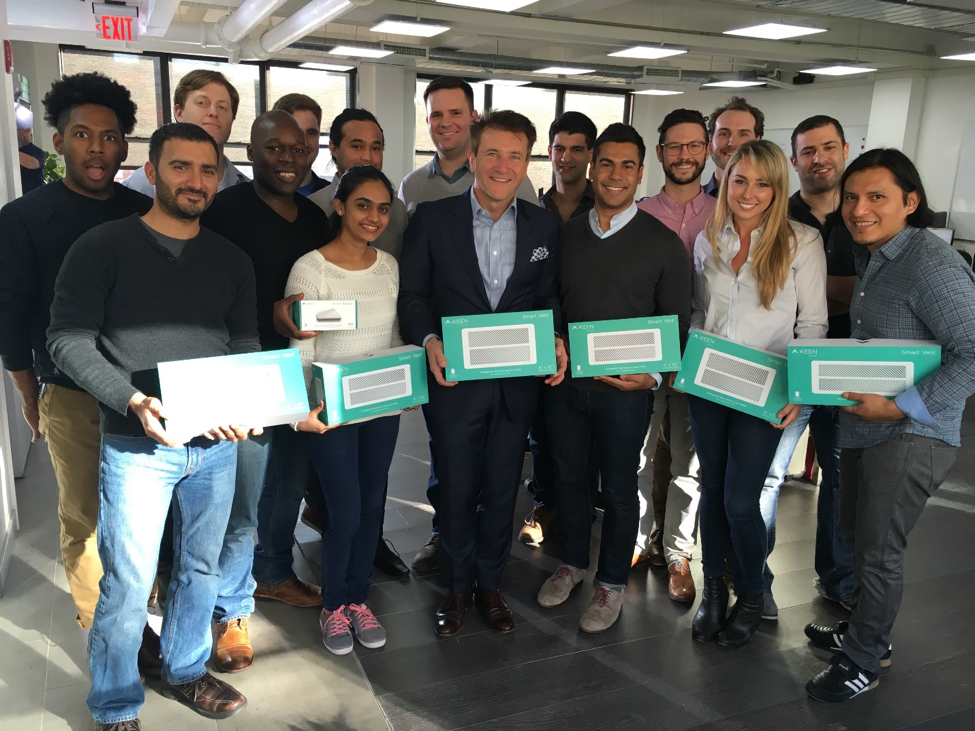 The Keen Home team with Robert Herjavec (April 2016)
The Keen Home team with Robert Herjavec (April 2016)


